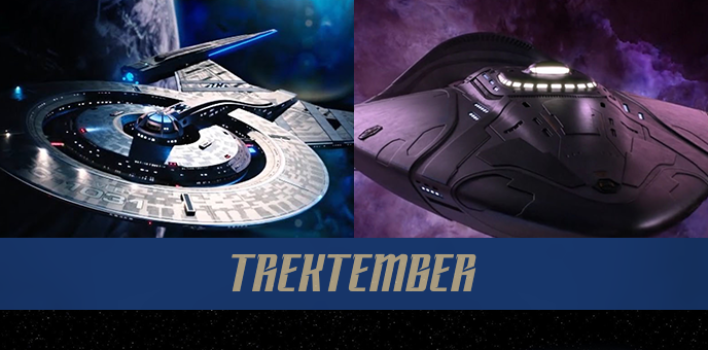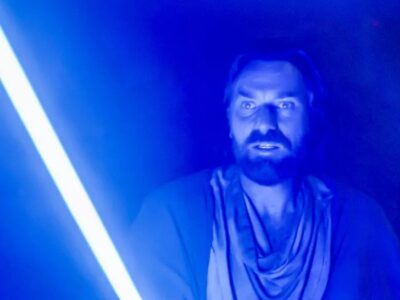Trektember: Season 3 Preview
If you just want to see the episode list, click here.
Welcome to the third season of Trektember! Over the past two years, we’ve taken the month of September to dive deep into Star Trek through the lens of Scripture. This year, we’re asking two questions: first, the crucial question that becomes relevant again every time a new Trek show comes on the air: What “is” Star Trek? And second, what does the classic sci-fi show have to say about humanity and about faith?
What is Star Trek?
Subsequent shows after The Original Series widened the definition each time: Star Trek didn’t have to feature Kirk or Spock, it didn’t have to be set on a spacecraft, and it could be about getting home instead of exploring. It could even be set before the Federation ever existed! So if the characters, setting, theme, and era don’t define Star Trek…what “is” Trek?
It was originally pitched to studios as “Wagon Train to the Stars” by creator Gene Roddenberry: a story about recurring characters “who travel to worlds ‘similar’ to our own.” but even that description is pretty unhelpful to a modern audience who has never heard of Wagon Train, and the details in his pitch could apply to pretty much any spacebound science fiction story televised in the last fifty or so years.
So what sets Star Trek apart?
What does Star Trek have to say about humanity and faith?
Star Trek‘s creator, Gene Roddenberry, is well-known to have been a secular humanist with little use for God. The main characters and overall ethos that populate his shows reveal no real need for any faith or religion, aside from a faith in the boundless potential of the power of humanity.
Still, he also populated his universe with a cast of demigods and false gods—and, in the case of Q, an omnipotent being who is only not a god by the barest of technicalities. The topics and ideas explored in the franchise also have deep connections to Biblical storylines and ideas, and the humanity in the show continues to grow more and more into the humanity that the Bible knows we can be and would have us become through Christ. The show’s characters are fascinating, its narratives are compelling, and its ideas and themes are rich.
Trektember Two-For-One
This year, we have a remarkable opportunity: to explore the first seasons of two different Star Trek shows (or, rather, one Trek show and one “Trek-adjacent” show) in hopes of nailing down the answers to those two questions. We’ll be looking at Star Trek: Discovery and The Orville in hopes of discovering what makes something Trek, and what each one says about human nature. And hopefully, when these two shows come back this winter, we’ll have something deeper to talk about than whether or not Klingons should have hair.
So, welcome aboard! Trektember 2018 begins tomorrow at noon, right here on Reel World Theology. We hope you’ll enjoy it.
And, if you’d like to catch up on previous Trektembers, click here.









Pingback: Trektember: “Star Trek: Discovery” Preview | Reel World Theology
Pingback: Trektember: Context is for Kings | Star Trek: Discovery | Reel World Theology
Pingback: Trektember: The Butcher’s Knife Cares Not for the Lamb’s Cry | Star Trek: Discovery | Reel World Theology
Pingback: Trektember: Lethe | Star Trek: Discovery | Reel World Theology
Pingback: Trektember: If the Stars Should Appear | The Orville | Reel World Theology
Pingback: Trektember: Pria | The Orville | Reel World Theology
Pingback: Trektember: Krill | The Orville | Reel World Theology
Pingback: Trektember: Into the Forest I Go | Star Trek: Discovery | Reel World Theology
Pingback: Trektember: Majority Rule | The Orville | Reel World Theology
Pingback: Trektember: Despite Yourself | Star Trek: Discovery | Reel World Theology
Pingback: Trektember: Into the Fold | The Orville | Reel World Theology
Pingback: Trektember: The Wolf Inside | Star Trek: Discovery | Reel World Theology
Pingback: Trektember: Cupid’s Dagger | The Orville | Reel World Theology
Pingback: Trektember: The Wrath of Khan | Classics | Reel World Theology
Pingback: Trektember: Vaulting Ambition | Star Trek: Discovery | Reel World Theology
Pingback: Trektember: Command Performance | The Orville | Reel World Theology
Pingback: Trektember: Si Vis Pacem, Para Bellum | Star Trek: Discovery | Reel World Theology
Pingback: Trektember: New Dimensions | The Orville | Reel World Theology
Pingback: Trektember: Mad Idolatry | The Orville | Reel World Theology
Pingback: Trektember: Season 3 Wrap-Up | Reel World Theology